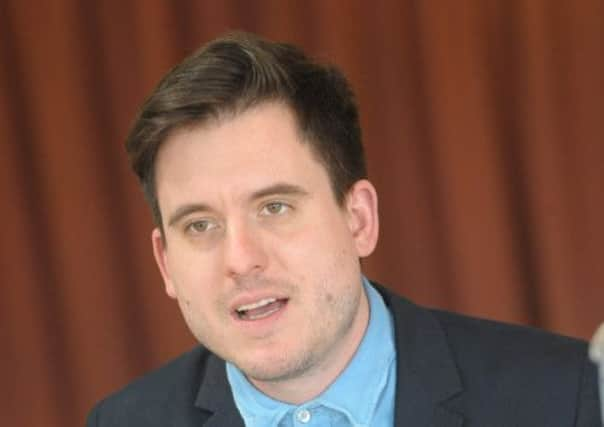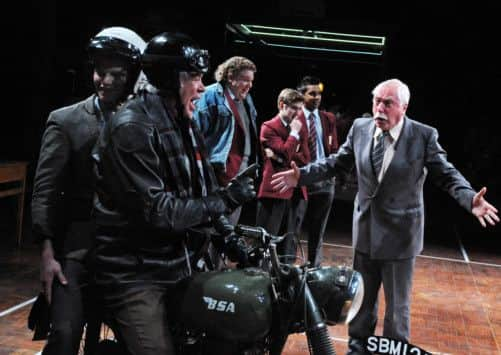Brand new perspective on firm favourite


Young director Michael Longhurst has a pretty challenging proposition on his hands – delivering a brand new version of a much-loved play in the city in which it is set. However, with a string of successful productions at the Royal Court, the RSC and the Bush Theatre behind him, as well as directing Jake Gyllenhaal in his American stage debut at the Roundabout Theatre in New York last year, he is more than equal to the task.
Longhurst is at the helm of a revival of Alan Bennett’s hugely popular play The History Boys which opened at the Crucible Theatre in Sheffield last week. Set in the 1980s at a Sheffield boys grammar school, the play centres on a group of sixth formers who are preparing for Oxbridge entrance exams under the tutelage of two very different teachers – eccentric, middle-aged Hector whose flamboyant and joyful approach to imparting knowledge brings lessons vividly to life, and cynical, ambitious young master Irwin who has been brought in by the headmaster to ensure that the boys make the grade.
Advertisement
Hide AdAdvertisement
Hide AdThe original production at the National Theatre in 2004 was a massive hit launching the careers of young actors Dominic Cooper, James Corden and Jamie Parker among others. It transferred to the West End then to Broadway, winning several awards along the way, and went on to become a successful film in 2006.


Both the stage play and film featured the late Richard Griffiths in the role of the charismatic Hector whose undeniably positive influence and passion for education is counterbalanced by his habit of fondling his pupils while giving them a life on his motorbike. In the current climate particularly, Hector’s behaviour is seen, quite rightly, through a different prism from when the play is set – and even when it first appeared – and Longhurst acknowledges that this is something he struggled with when first reading it. “I felt confused about the fact that the play did not judge Hector and his actions,” he says. “Of course you have to remember that the boys aren’t children – they are all 18 – but that doesn’t mean that there’s not a really complex power struggle going on.”
Speaking to him while still in rehearsal, Longhurst tells me that as a company they haven’t yet decided definitively on their approach on this issue, but says that he is quite prepared for it to be contentious. “After reading it, I wanted to make sure I had a take on the play that I was comfortable delivering,” he says. “There’s quite a generational difference on this kind of conduct at school. I went to a comprehensive school in south London where the idea of teachers touching pupils was unthinkable. We have to love Hector for the play to work but he is a really tragic figure. The way I have approached it is this – what do we do when someone we love does something abhorrent? There are some really interesting questions to take on. The boys joke about being traumatised by their experiences, when they clearly aren’t, but it is a bit like they are being ‘groomed’.” Rehearsing the play in the context of Michael Gove’s education reforms has also been very timely, he says.
“There is a lot to access. It’s been a real pleasure to dig into to it all.” Much of Longhurst’s work in the past has been directing new writing, so this has been an interesting process for him. “It’s a very different experience for me not to be working with the writer in the rehearsal room,” he says. “With new writing there is a lot of dramaturgy involved and you are relying on hope and an instinct that you are going to get it right. This is a play that is so loved – it is revealing layer upon layer as we are rehearsing it.” Longhurst says he has thoroughly enjoyed working with the cast which is made up of older, seasoned performers and young actors in the early stages of their careers. “They are an incredible company,” he says.
Advertisement
Hide AdAdvertisement
Hide Ad“You are mixing different generations of actors and that makes for a very vibrant and animated rehearsal room. We will be introducing a whole new generation of actors to the audience – just as the original did – and that’s really exciting.” This is Longhurst’s first time directing at the Crucible and he is enjoying the space. “It’s the biggest stage I have worked on so far,” he says. “It’s an arena – different from the proscenium arch production at the National – the audience will be able to see all of school life on the stage at the same time.
“The boys at the beginning are big fish in a small pond until the school becomes a kind of prison to them and they are ready to burst out of it. You will be able to see what’s happening in the headmaster’s office and the staff room.” Presenting a new take on a modern classic has been an exciting project, he says, and he is especially happy to be giving The History Boys “a homecoming” to the city in which it is set. There is pressure on us to get the accents right and create a Sheffield authenticity but at the same time this is not a piece of naturalism.”
Matthew Kelly is taking on the role of Hector and according to Longhurst is making the part very much his own, not always an easy task when another actor is so much associated with it. “Matthew is doing exquisite work in the rehearsal room,” he says. “He is an incredible actor – people forget that he has won an Olivier award. He was two years below Richard Griffiths at drama school and he brought in a photograph of them taken at the time. It was quite poignant.
“The play is about the pain of nostalgia, about finding your place in the world and, for the older generation, looking at what your life has amounted to –and that has extra resonance following Richard’s passing.”
Advertisement
Hide AdAdvertisement
Hide AdThe History Boys, Crucible Sheffield to June 8. www.sheffieldtheatres.com
History of the History Boys
Alan Bennett’s play premiered at the National Theatre in May 2004, directed by Nicholas Hytner. It played to sell-out audiences. Richard Griffiths, James Corden, Dominic Cooper, Russell Tovey and Frances de la Tour were among the original cast. It opened on Broadway in April 2006. Originally scheduled to run to September, it was extended to October. It won multiple awards including the 2005 Olivier Award for Best New Play and the 2006 Tony Award and New York Drama Critics Circle Award for Best Play. In 2006 a film adaptation was released, adapted by Bennett, directed by Nicholas Hytner and featuring the original stage cast.